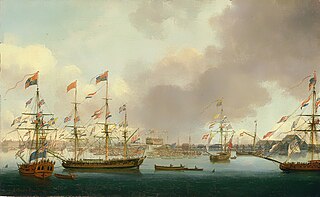Related Research Articles
Sixteen different ships of the British Royal Navy have been named HMS Greyhound, after the greyhound, a breed of dog notable for its speed.
Five ships of the Royal Navy have been named HMS Hebe, after the Greek goddess Hebe.
Six ships and a training establishment of the Royal Navy have borne the name HMS Imperieuse:
Twelve ships of the Royal Navy have been named HMS Active or HMS Actif, with a thirteenth currently under construction:

HMS Sirius was a 36-gun fifth-rate frigate of the Royal Navy. Between 1797 and 1805, the Sirius was engaged in maintaining the blockade of Napoleonic Europe. She was lost in 1810 when her crew scuttled her after she grounded during the Battle of Grand Port.
Numerous Royal Navy vessels have been named HMS Dolphin after the dolphin.

HMS Alexander was a 74-gun third-rate of the Royal Navy. She was launched at Deptford Dockyard on 8 October 1778. During her career she was captured by the French, and later recaptured by the British. She fought at the Nile in 1798, and was broken up in 1819. She was named after Alexander the Great.
Thirteen ships of the Royal Navy have borne the name HMS Experiment:
Four ships of the Royal Navy have been named HMS Charon, after Charon, the boatman to Hades across the River Styx in Greek Mythology:
Eleven ships of the Royal Navy have borne the name HMS Blonde:
Twenty-two ships of the Royal Navy have borne the name HMS Falcon. They are named after an exceptionally fast bird of prey.
Five ships of the Royal Navy have borne the name HMS Flora:
Eight ships of the Royal Navy have borne the name HMS Dover, after the English town and seaport of Dover:
Eight ships of the Royal Navy have borne the name HMS Espiegle
Four ships of the Royal Navy have borne the name HMS Heroine:

HMS Inconstant was a 36-gun Perseverance-class fifth-rate frigate of the Royal Navy. She had a successful career serving in the French Revolutionary and Napoleonic Wars, capturing three French warships during the French Revolutionary naval campaigns, Curieux, Unité, and the former British ship HMS Speedy.
Six ships of the Royal Navy and one naval base have borne the name HMS Stag:
Seven ships of the Royal Navy have borne the name HMS Victor:
Four ships of the British Royal Navy have been named HMS Proselyte:
HMS Iphigenia was a 32–gun fifth-rate frigate of the Royal Navy. She was launched in 1781, and served barely 20 years when she was accidentally lost in a fire at Alexandria in 1801.
References
Colledge, J. J.; Warlow, Ben (2006) [1969]. Ships of the Royal Navy: The Complete Record of all Fighting Ships of the Royal Navy (Rev. ed.). London: Chatham Publishing. ISBN 978-1-86176-281-8.